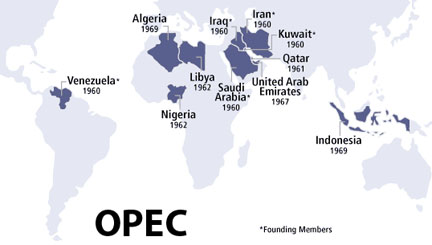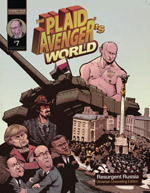The State Can Take It or Leave It: Nationalization v. Privatization
 What is happening my plaid party people? The Avenger decided to stay on here in Russia for another day to work off my wicked Putin-induced vodka martini hangover…and to investigate the nationalization of Russian oil; a process that has also been going down in Kazakhstan, in Bolivia, and in Venezuela too. And man, the
What is happening my plaid party people? The Avenger decided to stay on here in Russia for another day to work off my wicked Putin-induced vodka martini hangover…and to investigate the nationalization of Russian oil; a process that has also been going down in Kazakhstan, in Bolivia, and in Venezuela too. And man, the
How Russia is Nationalized: The Oil Sector
Zimbabwe Votes to Take Control of Foreign-Owned Mines
Exxon pursues arbitration against Venezuela over seizure of oil assets
Chavez threatens to nationalize Venezuelan private schools
Bolivian President Seizes Gas Industry
…and the opposite side of the coin:
Japan begins privatization of its mammoth postal system
Activists Oppose Egyptian Healthcare Privatization
Iran to Privatize Airline, Banks
India’s Privatization Plan Is On Track
So what’s the deal with these two terms? They are polar opposites my friends, and folks around the planet have passionate views about the good or evil effects that nationalization or privatization can produce. People get downright hot and bothered about these terms! And in some circumstances, initiating these actions has caused political dissent, diplomatic friction, or outright violent hostilities between peoples, companies, and even countries! Damn! Why so much heat? First…what are they?
Nationalization is a process whereby a government takes control of an economic activity that was owned by and/or run by private individuals/companies hands. It could be transportation, corn, water, uranium, or even bananas…but usually it happens to high-dollar commodities. For example: Exxon acquires rights thru a government contract to pump shit tons of oil out of selected oil fields in  goes there and sets up shop, building infrastructure like the oil wells and pipelines, and starts pumping and exporting oil. But then Hugo Chavez gets elected President of Venezuela and decides that Exxon is making too much money on that oil, and since the oil is actually in his country, he decides to take it back. All of it. So Hugo would nationalize the field, along with all the infrastructure that’s now on it, and send Exxon packing. Can you dig that?
goes there and sets up shop, building infrastructure like the oil wells and pipelines, and starts pumping and exporting oil. But then Hugo Chavez gets elected President of Venezuela and decides that Exxon is making too much money on that oil, and since the oil is actually in his country, he decides to take it back. All of it. So Hugo would nationalize the field, along with all the infrastructure that’s now on it, and send Exxon packing. Can you dig that?
But it never really works that simply. Even in this Venezuela/Exxon example (which actually happened) Hugo didn’t simply just kick Exxon out and take their shit; he offered to buy back their shares and their investments at a fair market value. Sometimes the parties have to go to court to negotiate these settlements (see Exxon story above). Nationalization of an industry often involves the government simply re-writing all prior contracts with the companies in such a way that the state owns more than 50% of the action. But make no bones about it: if the companies refuse to co-operate or sell back their shares, then the state will just take the shit from them!
And OMG nationalization so completely pisses off ‘the West’…especially the
So why would a state do this nationalization gig? Sometimes its done to protect a critical industry in times of war or emergency (some countries have nationalized steel during wartimes); sometimes its done because the industry is a matter of national security (Israel runs its airline industry); sometimes its done to an industry that is floundering and about to crash on its own (perhaps the US/health care issue). But more often than not, a state will reclaim rights on an industry that it feels it’s getting ripped off in. Stick with the oil example: when Exxon or Shell or anybody else is pumping oil out of
Let’s say a barrel of crude sells for $50 on the international market; Exxon may pay $5 to
Oh, by the way, did you see President Evo Morales of Bolivia on the Daily Show with John Stewart last  week? Totally hilarious! And Evo referenced why he decided to nationalize his countries oil and natural gas: “On the issue of nationalization of oil and gas,” Morales said, “in 2005, before I came president, the Bolivian state received only 300 million dollars from its oil and gas exports. And now since they’ve been nationalized, the Bolivian state receives more than two billion dollars. Therefore, we followed through on what we promised.”
week? Totally hilarious! And Evo referenced why he decided to nationalize his countries oil and natural gas: “On the issue of nationalization of oil and gas,” Morales said, “in 2005, before I came president, the Bolivian state received only 300 million dollars from its oil and gas exports. And now since they’ve been nationalized, the Bolivian state receives more than two billion dollars. Therefore, we followed through on what we promised.”
Are you starting to realize why this is happening at this particular juncture in history, particularly in the energy sectors? If you answered: ‘because the price of oil is freakin’ high, and expected to get even higher’ than you win the prize! Oil producing states see the future sales going nowhere but up, and want to have a bigger slice of the pie for themselves. Oil is one of those special commodities that kind of defies free market capitalism–in that lots of states control their industry as opposed to letting private individuals run the show. See map below for a few countries of note… And while die-hard capitalist countries claim that governments cannot run industries as well as private corporations, those states that are controlling their oil do seem to be making a holy shit load of cash right now…despite the fact that the private industry isn’t in charge. And speaking of private….

Privatization is precisely the opposite of nationalization: it’s when a state sells off an industry or  business that it controls to a private entity, most often a company/corporation. Look to the above story from
business that it controls to a private entity, most often a company/corporation. Look to the above story from
The theory goes like this: because private entities are motivated to maximize profits, they will do a better job making an industry like a post office more efficient, or they will work harder to find more oil, and are more flexible to invent new technologies and try new approaches which make the business run the best. Remember: one of the golden rules of capitalism is that competition will weed out the least efficient, and the better mousetrap will win every time. Folks of this opinion believe that governments are clunky, inefficient—and because they don’t have to compete with anybody—are uncompetitive! No shit? Lack of competition makes you become uncompetitive? Yeah, I can dig that!
Places like  privatizing like mad right now.
privatizing like mad right now.
And its not like the governments simply privatize the industry and then just walk away poorer for the experience. Capitalist theory would suggest that not only does the state make money on the initial sale of the industry, but in the long run will make way more in profits by simply taking a cut of the profits and/or taxing the service/product. Since private business will do it better, there will be more oil or more uranium or more corn or more stamped letters to tax…therefore the state makes more money! And without having to actually spend money running the damn show! You dig?
Does it sound like I’m picking sides on this nationalize/privatize debate? Don’t be fooled. The Plaid Avenger is here to tell you this: this is complicated shit, and there is no wrong or right side here. It really goes on a case by case basis in my book. Does private industry typically do shit better than government-run shit? Absolutely! Are some countries getting totally reamed by some private corporations? Absolutely! Are some states unfairly grabbing shit from corporations whose time and investments made the industry profitable in the first place? Absolutely! Are some multinational corporations total scumbags who use their money and power to corrupt and control industries within a state? Ab-so-fucking-lutely!
So pay attention to which states are selling, and which states are buying, their industries. And also pay attention to which industries are up for grabs. You will hear a lot in the  nationalization of the oil industry; and in
nationalization of the oil industry; and in
I just hope I can still get my damn collectable Godzilla stamps in Toyko…even if it is from a private vendor…

